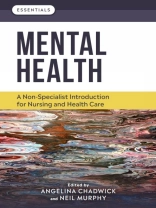Mental Health is an accessible introductory textbook aimed primarily at nursing and health care students who are not in the mental health field of practice but are seeking to understand mental health and become rounded practitioners. It will also be useful as a broad introduction for mental health nursing students.
Through clear explanations, examples and activities, the book will help you to recognise and support people with mental health issues whenever they are encountered in your practice. You will learn:
- What mental health is and how it interacts with physical health
- About different theories and models that are applied to understanding mental illness
- How to relate to and communicate with people experiencing mental health problems
- How to recognise the common diagnosable mental health disorders and understand the treatments and interventions that are applied to them
- About the impact that mental health issues can have on people at different stages of life, from childhood to adulthood and later life
- How to apply legal and ethical frameworks and to assess risk when supporting people with mental health issues.
- Written by a team of highly experienced mental health academics and practitioners, this book will help you to develop the underpinning knowledge and skills you need and to apply them in your own field of practice.
Pre-publication reviews
“Accessible and thorough, and definitely well pitched for non-mental health clinicians.” Senior Lecturer, Mental Health Nursing
“From an adult nursing point of view it’s got everything I would expect it to cover.” Adult nursing student
‘The book is very readable and accessible, I like the tone of the text as it is informative, and the activities give you chance to reflect…. The information is comprehensive without being too wordy, but academically sound. This book should be on the reading list for all nursing students and other HCP students. It should also be on the book shelf in all nursing offices, [social worker] offices, occupational health etc..” Mental health nursing student
“I would definitely recommend this book to non-specialists. I like the breadth of areas that the book covers.” Senior Lecturer, Mental Health Nursing
Essentials is a series of accessible, introductory textbooks for students in nursing, health and social care. New and forthcoming titles in the series:
The Care Process - Communication Skills
- Leadership
- Learning Disabilities
- Mental Health
- Promoting Health and Wellbeing
- Research and Evidence-Based Practice
- Study Skills
Inhoudsopgave
About the authors; Abbreviations; Introduction
1. Mental health and wellbeing
Angelina Chadwick and Lorna Mc Glynn
1.1 Introduction
1.2 Mental health and wellbeing
1.3 The relationship between mental health and physical health
1.4 Promoting mental health and wellbeing
2. Approaches to mental health
Seán Welsh
2.1 Introduction
2.2 The biomedical approach to mental health
2.3 Behavioural approaches to mental health
2.4 Psychological approaches to mental health
2.5 Cognitive approaches to mental health
2.6 Psychodynamic approaches to mental health
2.7 Humanistic approaches to mental health
2.8 Psychosocial approaches to mental health
2.9 Trauma-informed approaches to mental health
3. Communicating, relating and providing support
Elizabeth Tudor and Angelina Chadwick
3.1 Introduction
3.2 Communication skills
3.3 Core conditions
3.4 Therapeutic relationships / therapeutic alliance
3.5 Values and beliefs in practice
3.6 Person-centred and holistic care
3.7 Personal and professional boundaries
3.8 Patients transferred from a mental health setting
3.9 Challenging behaviour
4. Nursing and caring for individuals with mental health problems
Elizabeth Burns, Emma Street, Shelly Allen and Lisa Bluff
4.1 Introduction
4.2 Anxiety
4.3 Obsessive-compulsive disorder
4.4 Post-traumatic stress disorder
4.5 Depression
4.6 Bipolar disorder
4.7 Psychosis
4.8 Schizophrenia
4.9 Self-harm
4.10 Suicidal feelings
4.11 Eating disorders
4.12 Mental health difficulties in pregnancy and beyond
4.13 Alcohol and drug use disorders
4.14 Personality disorders
5. Mental health in early life
Celeste Foster and Eunice Ayodeji
5.1 Introduction
5.2 The link between child mental health and child development
5.3 Underlying principles of child mental health service provision in the UK
5.4 Understanding the legal framework for working with children and young people with mental health needs
5.5 Common mental health conditions in children and young people
5.6 Specialist child and adolescent mental health services (CAMHS)
5.7 Recognising signs of distress and responding helpfully
6. Mental health in adulthood
Lorna Mc Glynn, Neil Murphy and Shelly Allen
6.1 Introduction
6.2 Interventions
6.3 Mental health services
6.4 Roles
7. Mental health in later life
Rachel Price and Katie Davis
7.1 Introduction
7.2 The mental health of older people
7.3 Mental health conditions in older age
7.4 Self-harm and suicide in later life
7.5 Mental health assessment in later life
7.6 Therapeutic interventions in later life
7.7 Pharmacological interventions in later life
7.8 Mental health services for older people
8. Legal and ethical issues
Will Hough and Elizabeth Garth
8.1 Introduction
8.2 Legal frameworks
8.3 Ethics
8.4 Ethical theories
9. Risk
Neil Murphy
9.1 Introduction
9.2 Assessing risk
9.3 Considerations in assessing risk
9.4 Safeguarding
9.5 Boundaries
9.6 Mass media
9.7 Practicalities of the assessment of risk
References; Index
Over de auteur
Neil started his career as a mental health practitioner in 1980. He trained as a mental health nurse and then as a behaviour therapist, working predominantly in a community role and latterly, in his active practice, working closely with families. Neil is Senior Lecturer in Mental Health Nursing at the University of Salford and has worked in Higher Education since 2002, leading and developing new programmes aimed at enhancing the quality of training offered to nurses and also to cognitive behaviour therapists and advanced clinical practitioners. Neil’s main drive has been to equip as many people as possible in health care with mental health orientated skills in order to enhance care and foster client choice, empowerment and opportunity. His Ph D focused on the influence of media representations on mental health practitioners and Neil has published in many nursing journals and textbooks. His publications include ‘Experiences of ACP in training and the supervisors using a hub and spoke model’ published in Practice Nursing.












